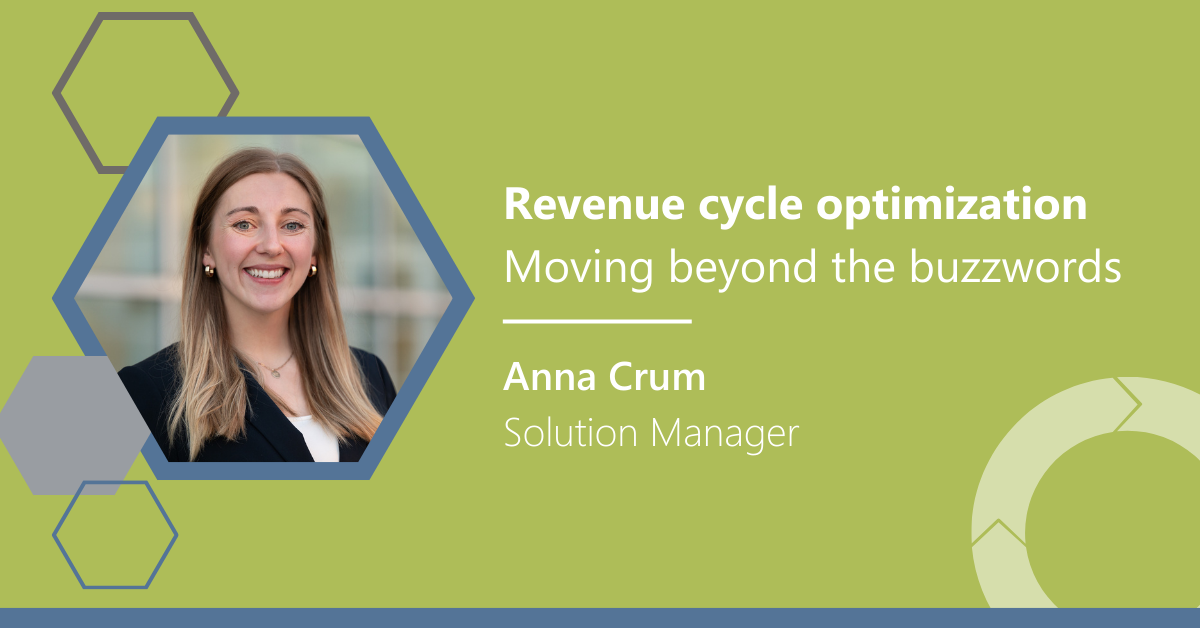
If you want to see just how solid your Epic build really is, take a look at your revenue cycle.
Clinical workflows come with their own complexities — provider preferences, specialty nuances, care variation — but revenue cycle workflows? That’s a whole different beast. You’re navigating a maze of changing payer rules, state-specific Medicaid programs, carveouts, vendors, and systems that don’t always talk to each other. Some tasks are handled in-house, others are outsourced. The moving pieces are endless.
So when people debate the value of Epic’s Foundation System (and they do — constantly), it’s not just theoretical. For anyone working in revenue cycle operations, it’s a real, pressing question: How do you keep up with all this change and avoid building yourself into a corner? In our minds, it starts with Foundation and weaves its way to managed services for better maintenance.
Why Foundation still matters
There’s a reason Foundation is part of every Epic conversation — whether it’s in discussions for an implementation, a Refuel, general maintenance, or system upgrades. It’s built on best practices from top-performing health systems and refined through Epic’s advisory councils and working groups. If you want long-term success with your EHR, Foundation is a smart place to start.
A Foundation-first approach can make things like upgrades, scaling, and user experience improvements significantly easier. It also helps improve standardization across your workflows, which is vital for operational efficiency. But here’s the thing — Foundation isn’t plug-and-play; it's not a one-size-fits-all solution.
Every organization is unique, with its own set of challenges and variances. So, while Foundation gives you a strong starting point, you still have to make thoughtful choices about where to customize — particularly in the revenue cycle, where change happens fast and rigid build falls apart even faster.
Revenue cycle: Where build gets stress-tested
The revenue cycle is a high-pressure, high-variation part of your organization.
Payer contracts shift. Medicaid programs vary state to state. A payer that used to be “in” is suddenly out. Prior authorization rules change mid-year. Carveouts come and go. Some functions are handled by your own staff, others by third parties. It’s messy — and it means your build should be flexible from day one.
Take something as simple as a list of plans built into a claim edit rule. That might work … until January 1st rolls around, and the payer rolls out a new set of plans. Now your rule doesn’t catch the right claims and you’re missing updates; you’re ultimately playing catch-up. The longer it takes to catch it, the more it disrupts cash flow and delays reimbursements, impacting your bottom line.
A solid Foundation build doesn’t mean avoiding customization altogether — it means customizing the right things. Dynamic logic, flexible workqueues, and thoughtful configuration — all of that matters if you want to keep up with the real-world changes thrown at revenue cycle shops. These types of customizations ensure your system adapts to both the expected and the unforeseen changes in payer rules, regulations, and patient needs.
The truth is, in revenue cycle management, flexibility is just as important as accuracy. The demands placed on the system change regularly, and having a rigid outline that lacks the ability to scale and adjust can quickly become a major hurdle.
The approach that works — and why AI depends on it
At Cardamom, our Foundation-first mindset is built around two core ideas:
- Getting full value from your Epic investment — you’ve already made the commitment, so let’s make it work for you.
- Standardizing where it counts — because clean, consistent data is the fuel for strong analytics and future AI.
This second point is especially important in the revenue cycle. AI and automation are rapidly becoming essential to maximize value — whether it’s predicting denials, optimizing workqueues, suggesting codes, or identifying errors before they impact cash flow.
However, AI can’t fix foundational issues. If your build is messy or too rigid, or if you’ve built workarounds that don’t scale, you’ll struggle to take advantage of these tools. Foundation provides a strong base and smart customization is what makes it future proof.
Want to enable AI? Start by making your workflows flexible and your data consistent. Build rules that adapt. Standardize across specialties and sites. Clean up your category lists. That’s the prep work that allows AI to drive efficiency — not just in theory, but in your day-to-day operations. A system that’s dynamic and flexible can leverage AI capabilities in ways that improve productivity, reduce human error, and save significant time and money.
For example, Epic’s Likelihood of Payment Denial Recovery Model is trained on your organization’s Epic data and can help flag denied claims you’re most likely to recover. When applied to workqueues and claims processes, this kind of predictive model can enable much more efficient and cost-effective follow-up. However, its accuracy depends heavily on the quality of the data it receives. If foundational features like contracts or reimbursement methods are not well-maintained in Epic — or if the underlying data is messy or inconsistent — the model’s effectiveness can be significantly reduced and you won’t reap the benefits of the predictive model.
Where managed services comes in
Even the most solid build can degrade without proper, ongoing support. Payers change rules, your teams find workarounds, and before you know it, things aren’t working like they used to.
Revenue cycle leaders should think about long-term sustainability from the start. Leveraging a strong managed services partner helps you keep things optimized and responsive. Here’s how:
Adapting the build as requirements evolve
From regulatory changes to new internal processes, the revenue cycle is in constant motion. A strong partner ensures your system evolves in lockstep, so operations don’t miss a beat.
Helping your team reduce ticket backlogs
When things break down, your team is forced to spend valuable time troubleshooting issues instead of focusing on higher-value tasks. Managed services can help minimize these disruptions, ensuring strategic priorities are moving full steam ahead.
Supporting your data quality and preparing you for AI adoption
AI’s value is closely tied to data quality. A managed services team ensures your data stays clean, accurate, and consistent, primed for AI-driven optimization that your organization needs.

It’s not just about fixing what’s broken — it’s about continuously improving, staying up-to-date, and freeing up your IT team to focus on strategic work instead of reactive firefighting. Having a proactive managed services partner means that your team is always one step ahead.
Getting future-ready
A smart revenue cycle needs smart, flexible build that has the support to keep up with constant change, automation best practices, and sets your team up for long-term success. Epic Foundation gives you the starting point, but how you build on it makes all the difference. Flexibility in your build coupled with continuous support and an eye toward leveraging AI and automation creates a revenue cycle that’s efficient, adaptive, and primed for the future.







